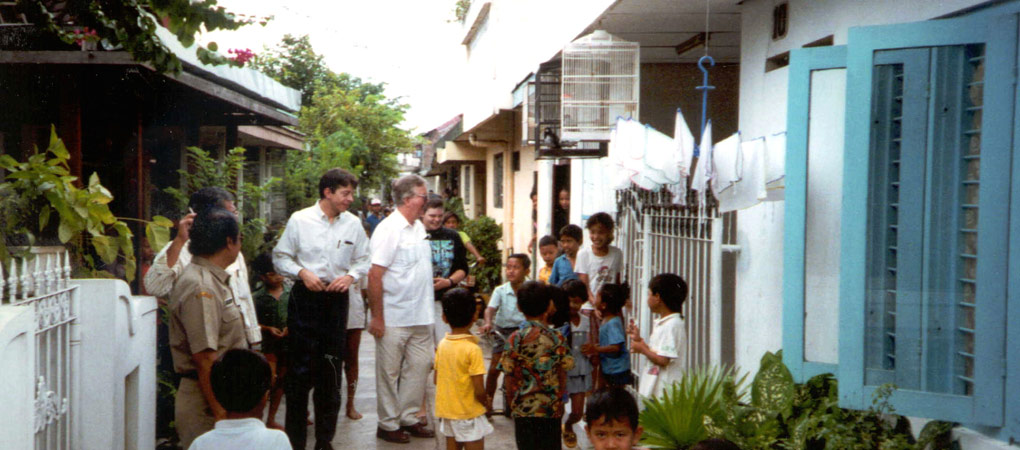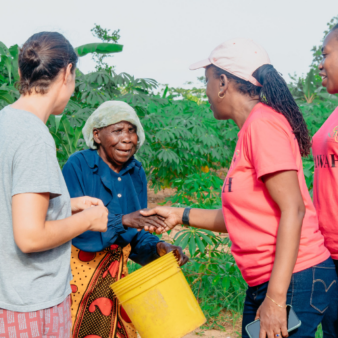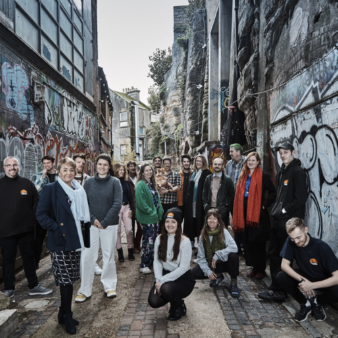The Kampung Improvement Programme originally started in the 1920s when action was taken to prevent the spread of disease from the kampungs to the neighbouring better-off residential districts. Today’s extensive programme in Surabaya was started in 1969 and it has currently improved 70 per cent of the kampungs in the city. Although such improvement programmes are taking place throughout Indonesia, those in Surabaya are unusual in the strength of the partnership that has developed between the low-income communities and the municipal authorities. This has been aided by the cooperation of the local Institute of Technology under the direction of Professor Johan Silas.
The Surabaya Kampung Improvement Programme is a comprehensive neighbourhood programme which not only creates improved living conditions for low-income families but also, by involving the local community in the process, ensures its long-term sustainability and on-going improvement.
Improvement of the basic physical infrastructure of the kampung is the key element of the programme. New pathways and roads are provided, with side drains alongside them. The construction of pathways is particularly important, accounting for one third or more of expenditure. Vehicular roads are kept to a minimum accounting for only 18 per cent of expenditure. The extremely limited access available for cars means that improved kampungs are not invaded by middle-income families and therefore remain affordable to low-income families. Recent surveys carried out in the kampungs show this to be the case with 90 per cent of the kampung population living there for five years or more.
Side drains are provided alongside the footpaths for the disposal of waste water and for rapid run-off of rainwater. Each house has its own septic tank which is emptied regularly. Public toilets and washing facilities are also provided. A water supply network with stand-pipes is provided throughout the Kampung, with each stand-pipe serving 25 – 35 families.
Supplies of drinking water are also purchased from street vendors on a daily basis. Wells are used to provide water for non-drinking needs and the quality of this water continues to be improved.
During the years 1984-1990 under the Urban Kampung Improvement Programmes in Surabaya, 70 km of access roads and 150 km of footpaths were improved, 93 km of drains and culverts were constructed and 56,000 m of water pipe laid. Eighty-six public bathing, washing and toilet facilities were built.
Improvements to the dwellings themselves are carried out by the residents and are not part of the programme.
The most immediate impression in walking into an improved kampung is its cleanliness and the abundance of planting that is to be seen everywhere. Trees, bushes, flowering plants line the street and adorn the fronts of houses. Small trees and plants are set in pots or in specially constructed borders and are tended by families in the adjacent houses. The presence of the plants helps create a new micro-climate in the kampung, cooling the hot dry climate in these high-density settlements. The plants are also effective in cleaning dust and other debris from the air. The costs of providing the plants are met by the community with the women of the community collecting the necessary money and planting and caring for the trees and other plants. Street signs and lights were also provided by the local people, as well as the yellow and blue rubbish bins found on every pathway and road in the kampung. Made out of disused car tyres, the yellow-painted ones are for disposal of non-recyclable material and the blue-painted ones are for re-usable waste material, such as paper, glass, metals, plastics etc.
The community is involved in the Kampung Improvement Programme from the very earliest stages. Preliminary surveys on the physical conditions in the kampungs are carried out in co-operation with residents and the needs and problems of the community are discussed with them, providing the basis for future improvement plans. When proposals have been drawn up these are discussed with communities and changes and adjustments made where necessary. Only after the community reaches full agreement on how to share the burden of improving their own living environment can the implementation of the programme begin.
People are encouraged to carry out the planting and improvement of their own, on-plot, facilities and to take responsibility for the on-going maintenance of the kampung. Community and local government work together as equal partners in development, committing time, labour and funds to the project. On average, for every Rp 1 million invested by the government in KIP there is a Rp 500,000 contribution from the community and this excludes community efforts in providing planting, street lighting, entrance gates, rubbish bins etc. Time and again it has been found that residents will use and care for facilities and services if they are involved in their creation and running. The kampung communities arrange to carry out minor repairs and improvements to the physical infrastructure and pay for their own rubbish collection service. This is in addition to the street sweepers and cleaners paid for by the local government.
Ten years after implementation, infrastructure and buildings are well maintained and in many cases have been improved and extended. The public toilets and baths operate on a pay-as-you-use basis with the family in the nearest house taking responsibility for the facility, using the small fee charged to pay someone to clean and maintain it.
Kampungs provide favourable conditions for starting any kind of informal business or home industry, since there are few overheads and many of the sites are centrally located. Wherever possible, residents are encouraged to set up their own small businesses. Almost 70 per cent of dwellings in the kampungs have some sort of economic activity based there. Making and selling masks, fans, decorated bird cages, preparing and selling home-made food, tailoring shops and small beauty salons can all be found in the kampungs.
Women play an important role in the Kampung improvement. Their involvement is channelled through the Family Welfare Organisation which is a community based organisation concerned to encourage the role of women in the development of their communities. It is consulted at all stages of the planning and implementation of the programme. Typical activities carried out by the women during the improvement work itself include monitoring building materials, supervising construction activities and keeping the workers supplied with food and drink. In maintenance and follow-up their role is even more crucial – they sweep footpaths, keep drains free of rubbish, collect money to buy trees and other plants and ensure that these are planted and looked after. Women are also encouraged to establish small businesses in the kampung, thereby helping to generate income and further improve the sustainability of their lives and those of their families. Businesses typically run by women are beauty salons, tailoring shops, home-made food supplies and other home-based industries.
Women working for the Family Welfare Organisation are drawn from the kampungs themselves and they work in their own kampung, among their friends and neighbours. They receive training to enable them to pass on the necessary water and sanitation and health messages, to encourage other women in their community to maintain and improve their homes and to encourage community health locally. They are also responsible for giving family-planning advice and child care guidance. They raise funds to support their activities and do much work with the youth organisations in the community. These women receive no pay for the work they do but are respected and well-known members of the community, easily identifiable by their blue uniforms.
The strength of the community’s contribution is a key factor in ensuring the continuation of the programme. On average, for every Rp 1 million invested by the government, the community contributes a further Rp 500,000.
Not included in the community contributions are the costs involved in planting vegetation along the footpaths, providing street lighting and rubbish bins and building the gates at the entrance to the street. Kampung improvements encourage further private investment by the residents on their houses and on-plot facilities. This total investment far exceeds the initial project costs.
The total cost of the Urban Kampung Improvement Programme during the years 1976 -1990 in Surabaya was US$40 million, of which US$13.5 million was met by the one million plus residents who lived in Kampungs improved by the programme. This represents a cost of US$26.5 per capita of public funding.
Partnership
Local government, national government, local community, academic/research, local community



